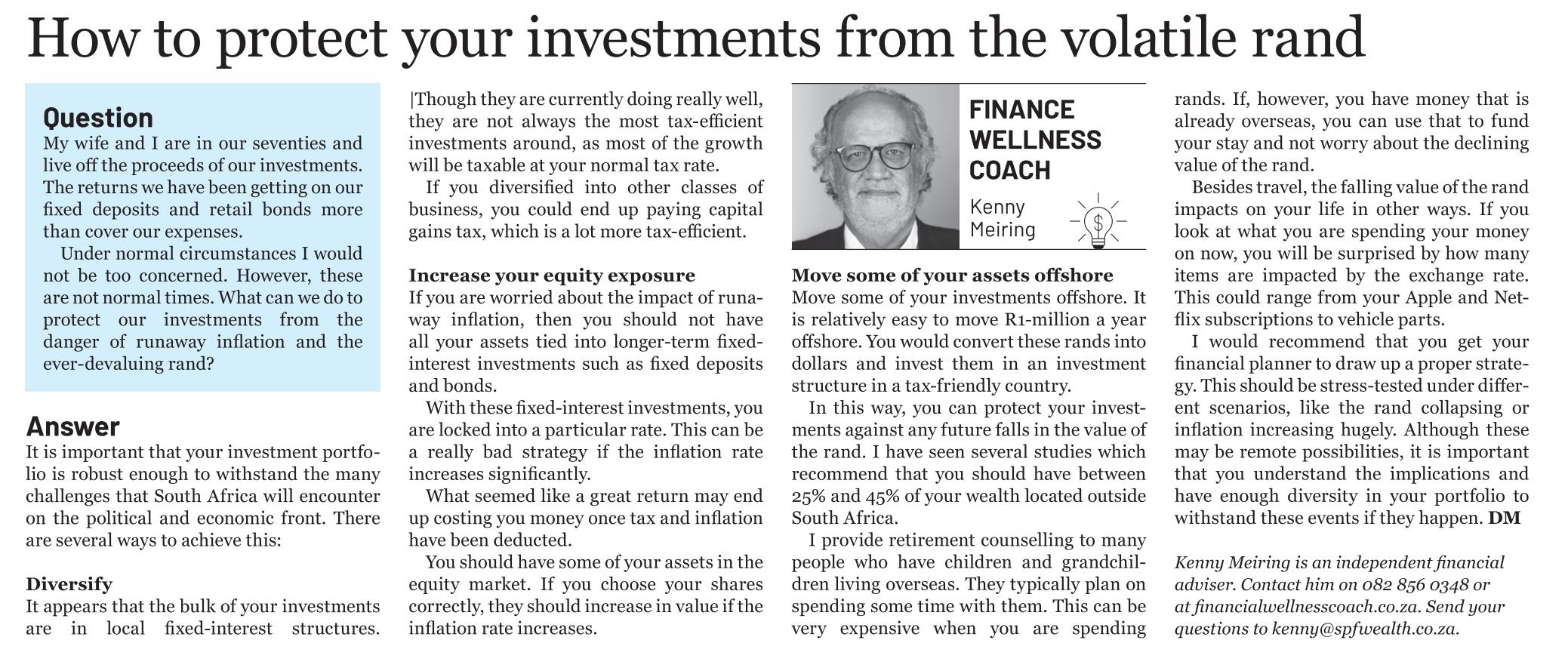162 - How to protect your investments from the volatile Rand

Question: My wife and I are in our seventies and live off the proceeds of our investments. The returns we have been getting on our fixed deposits and retail bonds more than cover our expenses. Under normal circumstances I would not be too concerned. However, these are not normal times. What can we do to protect our investments from the danger of runaway inflation and the ever devaluing Rand?
Answer: It is important that your investment portfolio be robust enough to withstand the many challenges that you will encounter on the political and economic front.
The key to this is to diversify.
At the moment, it appears that the bulk of your investments are in local fixed interest structures. While they are currently doing really well, they are not always the most tax efficient investments around as most of the growth will be taxable at your normal tax rate. If you diversified into other classes of business, you could end up paying capital gains tax which is a lot more tax efficient.
Increase your equity exposure
If you are worried about the impact of runaway inflation, then you should not have all your assets tied into longer term fixed interest investments like fixed deposits and bonds. With these fixed interest investments, you are locked into a particular rate. This can be a bad strategy if the inflation rate increases significantly. What seemed like a great return may end up costing you money once tax and inflation has been deducted.
You should have some of your assets in the equity market. If you choose your shares correctly, these should increase in value if the inflation rate increases.
Move some of your assets offshore
If you are concerned about the devaluation of the rand, one way of reducing this risk is to have some of your investments physically offshore.
It is very easy for you to move R1 million a year offshore. You would convert these rands into dollars and invest it in an investment structure in a tax friendly country. In this way, you will be able to immunize your investments against any future falls in the value of the rand. I have seen several studies where they recommend that you should have between 25% and 45% of your wealth located outside of South Africa.
I provide retirement counselling to many people who have children and grandchildren living overseas. They typically plan on spending some time with them. This can be very expensive when you are spending rands. If, however, you have money that is already overseas, you are able to use that to fund your stay and not worry about the declining value of the rand.
Besides travel, the falling value of the Rand also impacts on your life in other ways. If you look at what you are currently spending your money on, you will be surprised by how many of these items are impacted by the exchange rate. This could range from your Apple and Netflix subscriptions to motor car parts. Immunizing your finances from the depreciation in the Rand makes a lot of sense.
I would recommend that you sit down with your financial planner and get a proper strategy drawn up. This should be stress tested under different scenarios, like the rand collapsing or inflation increasing massively. Even though these may be remote possibilities, it is important that you understand the implications and have enough diversity in your portfolio to withstand these events if they happen.
Kenny Meiring MBA CFP ® is an independent financial adviser who helps people put investment and risk structures in place to live wonderful lives. You can contact him on 082 856 0348 or at Financialwellnesscoach.co.za. Please send your questions to kenny.meiring@sfpwealth.co.za
